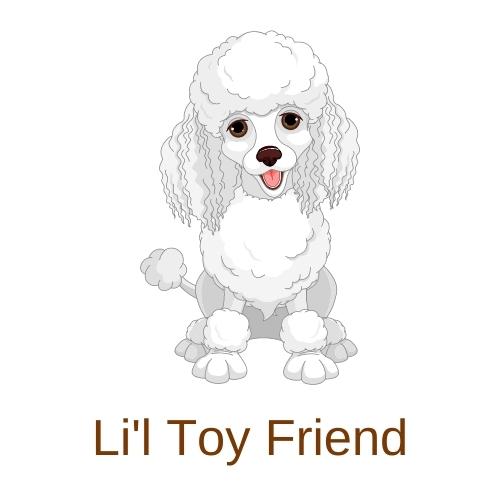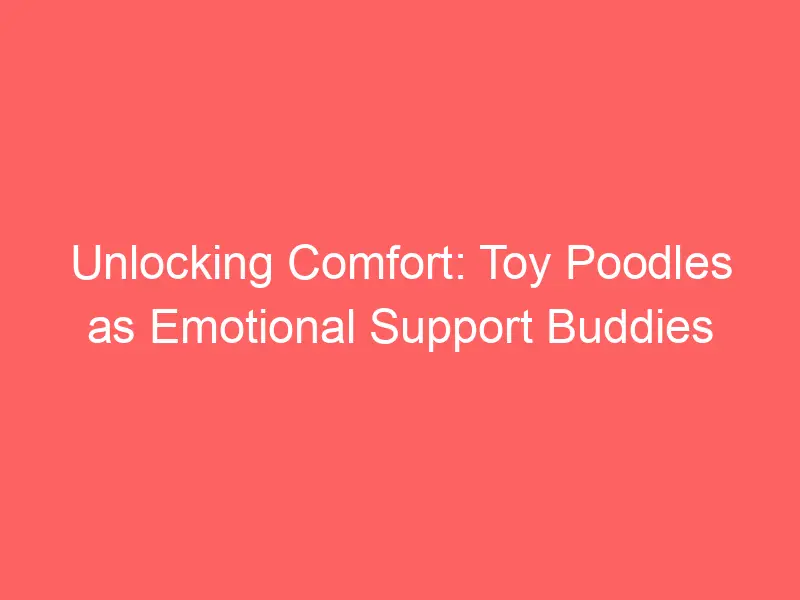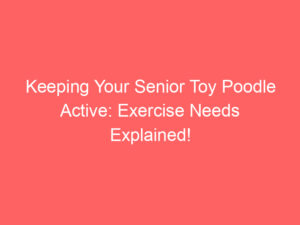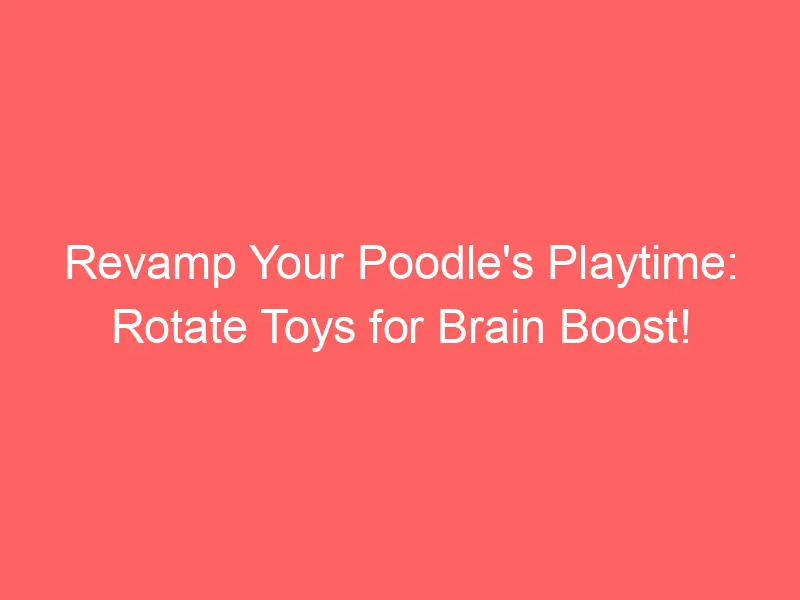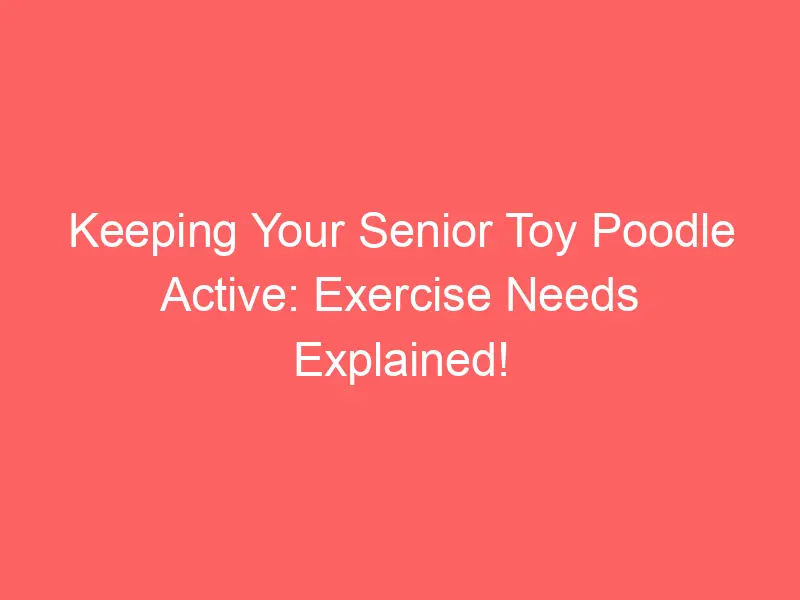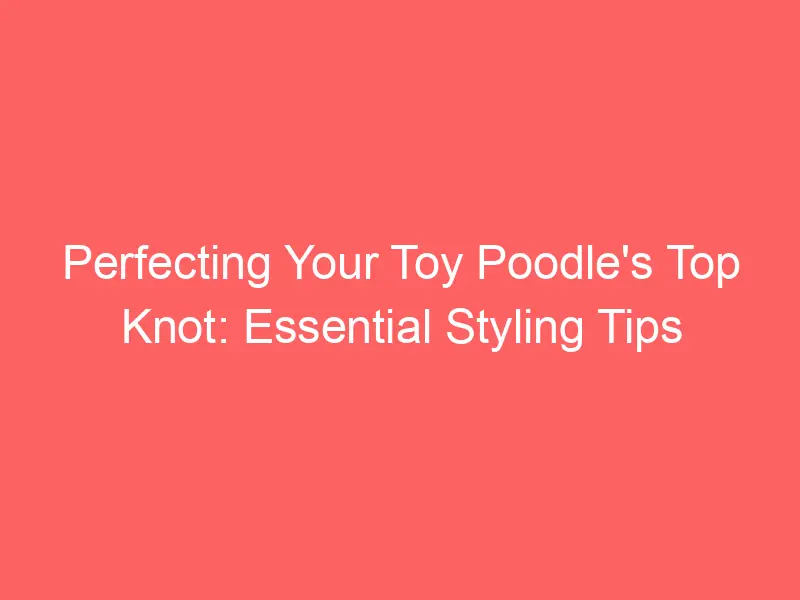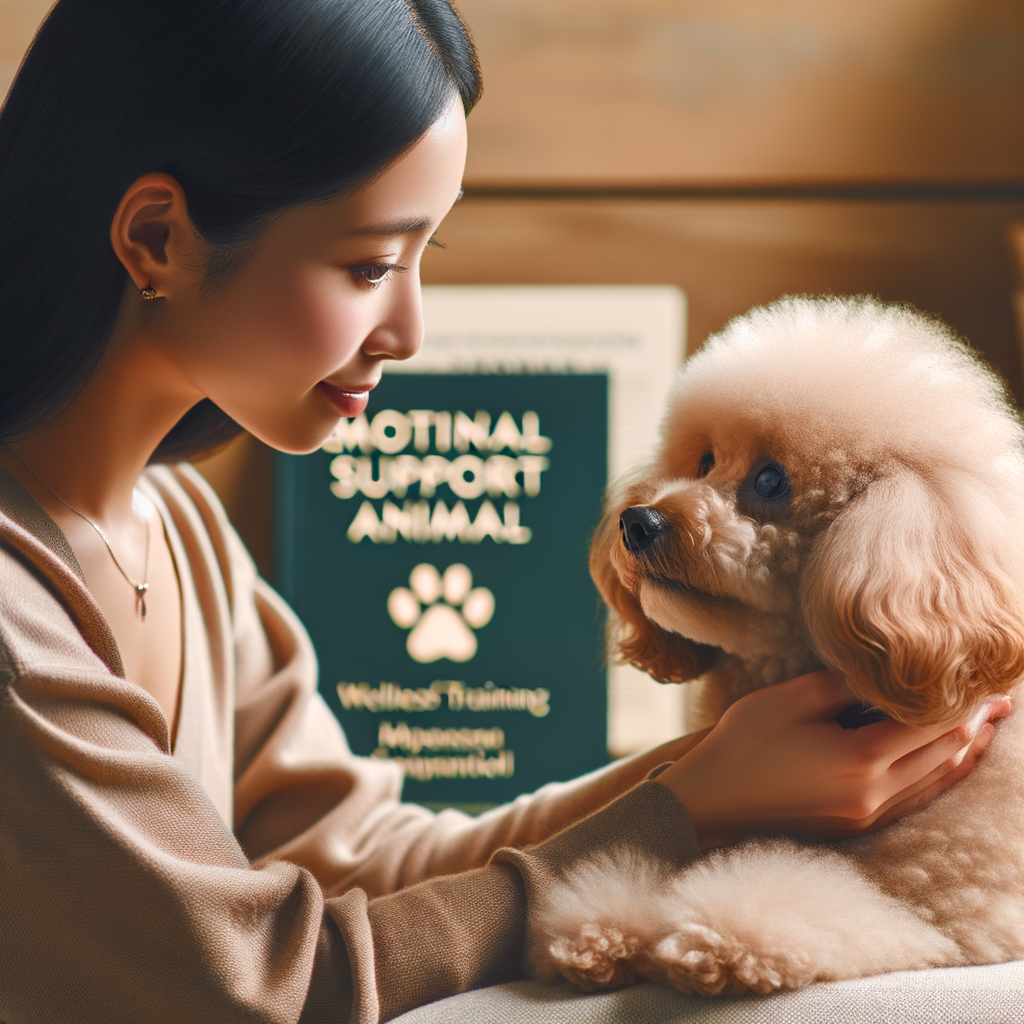
Introduction to Toy Poodles as Emotional Support Animals
Emotional Support Animals (ESAs) play a vital role in the lives of many people, offering comfort and companionship to those in need. One breed that stands out in this role is the Toy Poodle. Known for their intelligence, affectionate nature, and adaptability, Toy Poodles have become a popular choice as ESAs. In this section, we will delve into the role of ESAs and why Toy Poodles excel in this capacity.
- Understanding the role of Emotional Support Animals
- Why Toy Poodles make excellent Emotional Support Animals
ESAs are not just pets; they serve a therapeutic purpose for individuals dealing with emotional or mental health issues. They provide companionship, reduce loneliness, and can even help with depression, anxiety, and certain phobias. Unlike service animals, ESAs are not required to perform specific tasks. Their primary role is to offer emotional comfort and support. Learn more about ESAs here.
Toy Poodles are known for their intelligence, making them easy to train. They are also highly affectionate and form strong bonds with their owners, making them excellent companions. Their small size makes them ideal for apartment living or for those who travel frequently. Furthermore, Toy Poodles are hypoallergenic, making them suitable for individuals with allergies. With their loving nature and adaptability, it’s no wonder Toy Poodles are a top choice for an ESA.
In the following sections, we will explore the benefits of Toy Poodles as ESAs, understand their behavior, learn about their care and health, and delve into the requirements for an ESA. Join us as we uncover the joy of having Toy Poodles as Emotional Support Buddies.
The Benefits of Toy Poodles as Emotional Support Animals
Toy Poodles are not just adorable pets; they can also serve as emotional support animals. Their small size, intelligent nature, and friendly disposition make them ideal companions for individuals dealing with emotional or mental health issues. Let’s delve into the benefits of having a Toy Poodle as an emotional support animal.
- Emotional Support Poodles: A Case Study
- Key Takeaways from the Benefits of Emotional Support Poodles
- Companionship: Toy Poodles offer constant companionship, which can alleviate feelings of loneliness and isolation.
- Responsibility: Taking care of a Toy Poodle gives individuals a sense of purpose and responsibility, which can be therapeutic.
- Physical Activity: Toy Poodles require regular exercise, which can encourage their owners to engage in physical activity, boosting their mood and overall health.
- Stress Relief: Interacting with a Toy Poodle can help reduce stress and anxiety levels.
Consider the story of Jane, a woman suffering from severe anxiety. Jane’s therapist suggested she get an emotional support animal to help manage her condition. After researching various breeds, Jane decided on a Toy Poodle named Max.
Max’s presence had a profound impact on Jane’s life. His constant companionship helped Jane feel less isolated, and his need for care and attention gave her a sense of purpose. Jane reported a significant decrease in her anxiety levels after Max became a part of her life. This case study is a testament to the therapeutic benefits of Toy Poodles as emotional support animals.
From Jane’s story and numerous other similar experiences, we can glean several key benefits of having a Toy Poodle as an emotional support animal:
These are just a few of the many benefits of having a Toy Poodle as an emotional support animal. They are intelligent, loving, and adaptable, making them perfect companions for those in need of emotional support.
Understanding Toy Poodles Behavior
Toy Poodles are known for their intelligent and affectionate nature, making them excellent companions and emotional support animals. Let’s delve deeper into the behavioral characteristics of Toy Poodles that make them suitable for emotional support and provide some examples of how they provide this support.
- Characteristics of Toy Poodles that make them suitable for emotional support
- Examples of Toy Poodles providing emotional support
Toy Poodles are highly intelligent dogs, which allows them to understand and respond to human emotions effectively. They are also known for their loyalty and affection, which makes them excellent emotional support animals. Their small size makes them easy to manage and ideal for those living in apartments or small spaces. Toy Poodles are also hypoallergenic, making them suitable for individuals with allergies. Their energetic and playful nature can help to uplift the mood of their owners, providing emotional support and companionship.
There are numerous examples of Toy Poodles providing emotional support. For instance, a Toy Poodle named Bella helped her owner, who was suffering from severe depression, by providing companionship and a sense of purpose. Bella’s playful antics and affectionate nature helped her owner to focus on positive aspects of life, aiding in her recovery. In another example, a Toy Poodle named Max helped a veteran suffering from PTSD by providing comfort and reducing anxiety during stressful situations. Max’s presence helped the veteran to feel more secure and less anxious, demonstrating the powerful emotional support that Toy Poodles can provide.
Understanding the behavior of Toy Poodles is crucial in harnessing their potential as emotional support animals. Their intelligence, loyalty, affectionate nature, and ability to respond to human emotions make them ideal for this role. With proper training and care, Toy Poodles can provide significant emotional support and companionship to their owners.
Training Toy Poodles as Emotional Support Animals
Training your Toy Poodle to be an emotional support animal is a rewarding process that requires patience, consistency, and positive reinforcement. In this section, we will provide a step-by-step guide to training your Toy Poodle, as well as some tips and tricks for successful training.
-
Step-by-step guide to training Toy Poodles
Training a Toy Poodle to be an emotional support animal involves teaching them to respond to your emotional needs and provide comfort. Here’s a step-by-step guide:
- Understanding your needs: Before you start training your Toy Poodle, it’s important to understand what you need from them. This could be calming you down when you’re anxious, providing companionship when you’re lonely, or distracting you when you’re upset.
- Basic obedience training: Start with basic commands like sit, stay, and come. This forms the foundation for further training. Use positive reinforcement, like treats and praise, to reward your Toy Poodle for obeying commands.
- Socialization: Expose your Toy Poodle to different environments, people, and other animals. This helps them to be comfortable in various situations and reduces the likelihood of them becoming anxious or aggressive.
- Specific emotional support tasks: Once your Toy Poodle has mastered basic commands and is well-socialized, you can start training them on specific tasks that you need for emotional support. This could be laying their head on your lap when you’re upset or sitting next to you when you’re feeling anxious.
-
Tips and tricks for successful training
Training a Toy Poodle to be an emotional support animal can be a challenging process. Here are some tips and tricks to make it easier:
- Consistency is key: Be consistent with your commands and the way you reward your Toy Poodle. This helps them to understand what you expect from them.
- Patience: Training takes time. Don’t rush your Toy Poodle or get frustrated if they don’t understand a command right away. Keep practicing and they will eventually get it.
- Positive reinforcement: Always use positive reinforcement, like treats and praise, to reward your Toy Poodle for obeying commands. This encourages them to repeat the behavior.
- Professional help: If you’re struggling with training, don’t hesitate to seek help from a professional dog trainer. They can provide guidance and help you overcome any challenges you’re facing.
In conclusion, training your Toy Poodle to be an emotional support animal is a rewarding process that can significantly improve your mental health. With patience, consistency, and positive reinforcement, you can train your Toy Poodle to provide the emotional support you need.
Toy Poodles Care and Health
Toy Poodles, like all dogs, require specific care to stay healthy and happy. This section will focus on the general care for Toy Poodles, including their dietary needs and exercise requirements.
General Care for Toy Poodles
Toy Poodles are small dogs with big personalities. They are intelligent, active, and require a balanced diet and regular exercise to maintain their health. Let’s delve into the specifics of their care.
- Dietary Needs
- Exercise Requirements
Toy Poodles need a balanced diet to maintain their energy levels and overall health. They should be fed high-quality dog food that is rich in protein, carbohydrates, and healthy fats. Avoid feeding them human food, as some can be harmful to dogs. Always provide fresh water for your Toy Poodle.
Despite their small size, Toy Poodles are active and require regular exercise. Daily walks, play sessions, and mental stimulation activities like puzzle toys can keep them healthy and happy. Remember, a tired dog is a good dog!
Proper care for your Toy Poodle not only ensures their physical health but also their mental well-being. A well-cared-for Toy Poodle is a happy and content companion.
Toy Poodles Care and Health
Health Concerns and Regular Check-ups
As a Toy Poodle owner, it’s crucial to be aware of the common health issues that may affect your furry friend and understand the importance of regular vet check-ups. This knowledge will help you ensure that your Toy Poodle maintains optimal health and happiness.
- Common health issues in Toy Poodles
- Legg-Calve-Perthes Disease: A condition that affects the hip joint of the dog, causing lameness and pain. Learn more
- Progressive Retinal Atrophy (PRA): A group of genetic diseases that cause the retina of the dog’s eye to degenerate slowly over time, resulting in poor vision or even blindness. Learn more
- Hip Dysplasia: A genetic disorder where the thighbone doesn’t fit snugly into the hip joint, causing pain and lameness. Learn more
- Importance of regular vet check-ups
Toy Poodles, like all breeds, are prone to certain health issues. Some of the most common include:
Early detection of these conditions can significantly improve the quality of life for your Toy Poodle, making regular vet visits crucial.
Regular vet check-ups are vital to your Toy Poodle’s health. These visits allow for early detection of potential health issues, ensuring that your dog gets the necessary treatment as soon as possible. Regular check-ups also provide an opportunity for your vet to monitor your dog’s weight and diet, administer necessary vaccinations, and offer advice on how to keep your Toy Poodle healthy.
As a rule of thumb, adult Toy Poodles should have a complete vet check-up at least once a year. Puppies, senior dogs, and dogs with health issues may need to see the vet more frequently.
In conclusion, understanding the common health issues that can affect Toy Poodles and the importance of regular vet check-ups can help you provide the best care for your furry friend. Remember, a healthy dog is a happy dog!
Emotional Support Animal Requirements
Understanding the requirements for an Emotional Support Animal (ESA) is crucial if you’re considering your Toy Poodle for this role. Let’s delve into the legal requirements and the process of getting your Toy Poodle certified as an ESA.
- Legal requirements for Emotional Support Animals
- How to get your Toy Poodle certified as an Emotional Support Animal
Emotional Support Animals are protected under federal law, specifically the Fair Housing Act (FHA) and the Air Carrier Access Act (ACAA). These laws stipulate that individuals with a verifiable emotional or mental disability are entitled to live with their ESA even in housing with a “no pets” policy, and travel with them in the cabin of an aircraft at no extra cost.
However, it’s important to note that ESAs are not considered service animals under the Americans with Disabilities Act (ADA). This means they don’t have the same public access rights as service dogs. For instance, restaurants, hotels, and stores are not legally required to allow ESAs.
Also, to qualify for an ESA, you must be diagnosed with a mental health condition by a licensed mental health professional. The professional must write a letter stating that the animal is a necessary part of your treatment. Learn more about the legal requirements for ESAs here.
Getting your Toy Poodle certified as an ESA involves a few steps. First, you must have a diagnosed mental or emotional disorder. Some common conditions that may qualify include anxiety, depression, post-traumatic stress disorder, and panic disorder.
Next, you need to obtain an ESA letter from a licensed mental health professional. This letter should state that you have a mental health condition and that your Toy Poodle provides necessary emotional support that alleviates one or more of the symptoms or effects of your disability.
Remember, there’s no official registry for ESAs. Any site claiming to “register” your Toy Poodle as an ESA is likely a scam. The only valid proof of an ESA is the letter from your mental health professional.
By understanding the legal requirements and the certification process, you can take the necessary steps to have your Toy Poodle recognized as an Emotional Support Animal. This can open up new opportunities for you and your furry friend, enhancing your quality of life and well-being.
Conclusion: The Joy of Having Toy Poodles as Emotional Support Buddies
As we conclude our journey into the world of Toy Poodles as Emotional Support Animals (ESAs), we can’t help but acknowledge the joy and comfort these little furry friends bring into our lives. Their small size, intelligence, and affectionate nature make them perfect companions, especially for those in need of emotional support.
- Recap of the benefits of Toy Poodles as Emotional Support Animals
- Personal stories of Toy Poodles providing emotional support
Throughout this article, we’ve highlighted the many benefits of having a Toy Poodle as an ESA. Their intelligence makes them easy to train, and their affectionate nature makes them great companions. They are known to reduce stress, anxiety, and depression, and can even help with certain physical health conditions. Plus, their small size makes them ideal for those living in apartments or with limited space. Wikipedia provides more information on the breed’s characteristics and history.
We’ve heard countless stories of Toy Poodles providing emotional support to their owners. One such story is of a woman named Lisa, who suffered from severe anxiety. Her Toy Poodle, Bella, was always there to comfort her during her panic attacks, helping her calm down and regain control. Another story is of a man named John, who was battling depression. His Toy Poodle, Max, provided him with the companionship and love he needed during his darkest times. These stories are a testament to the incredible emotional support that Toy Poodles can provide.
In conclusion, Toy Poodles are more than just pets; they are emotional support buddies that can bring joy, comfort, and companionship into our lives. Their intelligence, affectionate nature, and small size make them the perfect ESA for many. So, if you’re considering getting an ESA, a Toy Poodle might just be the perfect choice for you.
